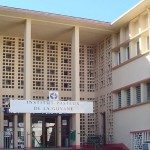Lien vers Pubmed [PMID] – 29045645
Lien vers HAL – Cliquez ici
Lien DOI – 10.1093/jac/dkx343
J Antimicrob Chemother 2018 Jan; 73(1): 231-239
Malaria is endemic in French Guiana (FG), South America. Despite the decrease in cases in the local population, illegal gold miners are very affected by malaria (22.3% of them carried Plasmodium spp.). Self-medication seems to be very common, but its modalities and associated factors have not been studied. The aim of this study was to evaluate parasite susceptibility to drugs and to document behaviours that could contribute to resistance selection in illegal gold miners.This multicentric cross-sectional study was conducted in resting sites along the FG-Surinamese border. Participating gold miners working in FG completed a questionnaire and provided a blood sample.From January to June 2015, 421 illegal gold miners were included. Most were Brazilian (93.8%) and 70.5% were male. During the most recent malaria attack, 45.5% reported having been tested for malaria and 52.4% self-medicated, mainly with artemisinin derivatives (90%). Being in FG during the last malaria attack was the main factor associated with self-medication (adjusted OR = 22.1). This suggests that access to malaria diagnosis in FG is particularly difficult for Brazilian illegal gold miners. Treatment adherence was better for persons who reported being tested. None of the 32 samples with Plasmodium falciparum presented any mutation on the pfK13 gene, but one isolate showed a resistance profile to artemisinin derivatives in vitro.The risk factors for the selection of resistance are well known and this study showed that they are present in FG with persons who self-medicated with poor adherence. Interventions should be implemented among this specific population to avoid the emergence of artemisinin resistance.


